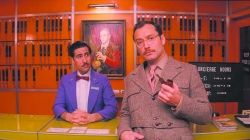
*** out of ****
Some people think Wes Anderson's films are masterpieces; others think they're excruciatingly cutesy quirkfests. Both sides have a point - he's a skilled filmmaker with a bad habit of being too precious at times. His latest, The Grand Budapest Hotel, is his best since The Life Aquatic.
The story is a flashback by an aged hotel proprietor (F. Murray Abraham) about the glory days of the titular hotel. It's set in a fictional European country in the '30s with war on the horizon. Abraham's character was a young man then (played by Tony Revolori) under the tutelage of the hotel's concierge (Ralph Fiennes). One of Fiennes' closest customers/friends (Tilda Swinton) is murdered and bequeaths a valuable painting to him. Soon, the woman's son (Adrien Brody) and his henchman (Willem Dafoe) are in hot pursuit of the concierge and lobby boy.
The movie works in large part because of Fiennes' terrific work as the lead. While he often gives strong performances as villains (Harry Potter, Schindler's List) or brooding romantics (The English Patient), he gets to show off considerable comedic skills as the vain but decent concierge.
The film's flashback structure also serves Anderson's style well. Because it's the memories of a man who's nostalgic for a long gone past, Anderson's cutesiness makes sense. Many people romanticize their youth, so it's appropriate for everything to have a heightened, stylized feel to it.
Anderson's most passionate detractors will still likely find stuff to hate, but for those willing to look, there's a lot to enjoy here.

